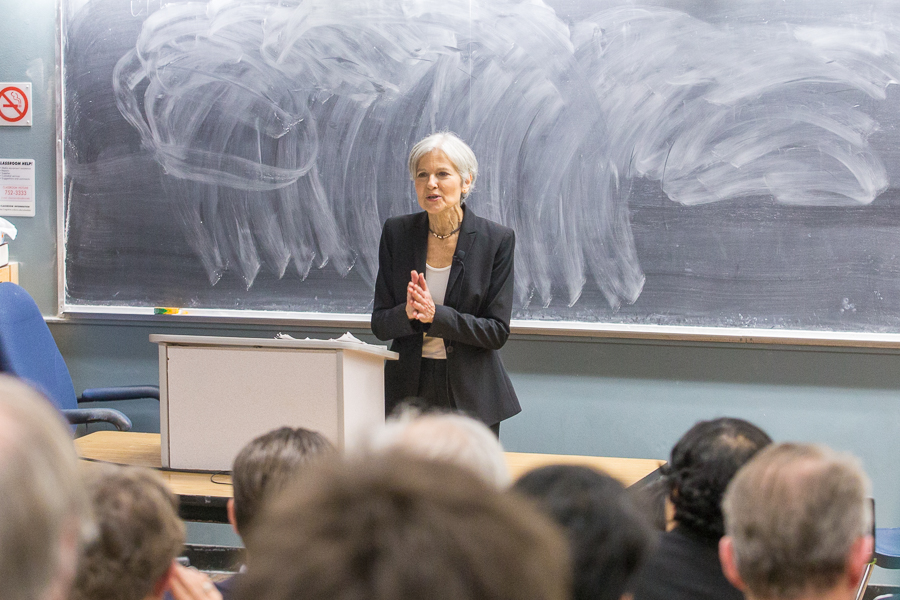
Former Green Party presidential candidate speaks to students, community members about environment, income inequality
Green Party presidential candidate Jill Stein spoke at a UC Davis rally on March 9 as part of a speaking tour across California. The event, sponsored by the Yolo and Sacramento Green Parties and the Black Student Union of UC Davis, also featured a speech by campaign manager David Cobb.
“This is a time of great peril and great possibility,” Stein said in her speech. “We’ve got to decide which one it is. We don’t have time to go through another four years of being led around by the nose. We are on borrowed time right now; it’s not going to be easy to get out of here alive.”
Throughout her speech, Stein touched on several issues pertinent to her platform, including healthcare, military spending, the environment, student debt and immigration.
Walter England, a fifth-year anthropology major and a student officer for the Yolo County Green Party, said that the rally provided an opportunity for community members to learn more about Green Party policies and ideas.
“[Stein] was paid by Humboldt University to speak, and she took that money and she used it to basically pay to travel up and down California, to meet at various different universities and towns to kind of rally different Greens,” England said. “So this is an opportunity for people and the public to kind of become more aware of the rising Green movement that’s happening right now, and to become aware of Green Party policies and the options that are available and the sort of actions that we help support.”
The rally was held in Wellman 2 and began shortly after 8 p.m. with a short musical performance and announcements by the Sacramento and Yolo County Green parties.
Adam Siegel, the local council secretary for the Yolo County Green Party, said that Stein will tour across California to take better hold of a rise in Green Party support since the election.
“There’s been an upsurge in Green Party activity since the election, since before the election obviously, and there’s been a renewed interest in revitalizing the county party councils across the state,” Siegel said. “Jill Stein is currently barnstorming the state. She was in Arcata earlier today, she’s in Berkeley tomorrow and then the state Green Party is meeting in Bakersfield this weekend, so it’s all sort of a let’s take stock of where we are in 2017 and look to what comes next.”
One of the prominent topics discussed was the lack of choice in the two-party system and a need for alternative candidates in the political field.
“There’s a lot of possibility out there,” Siegel said. “I think, you know, the last year showed most Americans that there’s a real worry that we may be at a real point of departure in the political landscape, so you know there’s a lot of progressive energy out there that’s in the Democratic Party, that’s in the Green Party, that’s in other third parties and that is outside the party structure. […] I think it’s important to build political alternatives or alternative political choices for voters.”
Stein, who at various times compared herself to U.S. Senator Bernie Sanders, said that the Democratic Party has prevented members from the left from having a role in the party structure.
“These are things that, as Bernie Sanders showed, is a majoritarian agenda,” Stein said. “You know, [Sanders] was constrained by the Democratic Party, but other than that, our agendas were pretty similar. He couldn’t quite step up to the plate on transforming from a war economy to a Green economy, and there are a few other things that the Democratic Party just won’t let you do, but the other thing that the Democratic Party won’t let you do is win an election.”
Following the election, many Green Party members have advocated against the new administration. England, who formerly supported Sanders, said that there are various ways in which liberal groups have continued to stay active in the current political climate.
“I was one of those people, those who were incredibly depressed by the outcome of the election,” England said. “But ultimately, no matter how hard it can get, there is always a path forward. There is always an avenue for hope and change, things that we can do to try and make differences and sometimes that can be trying to fight within the party to make it better like Justice Democrats, sometimes it can be creating entirely different organizations like Indivisible, and sometimes it can be bolstering third parties to kind of put pressure from the left onto our local, state and national governments to act in the interest of the unsung people on the left that often get ignored by traditional politics.”
Written by: Ivan Valenzuela — campus@theaggie.org









